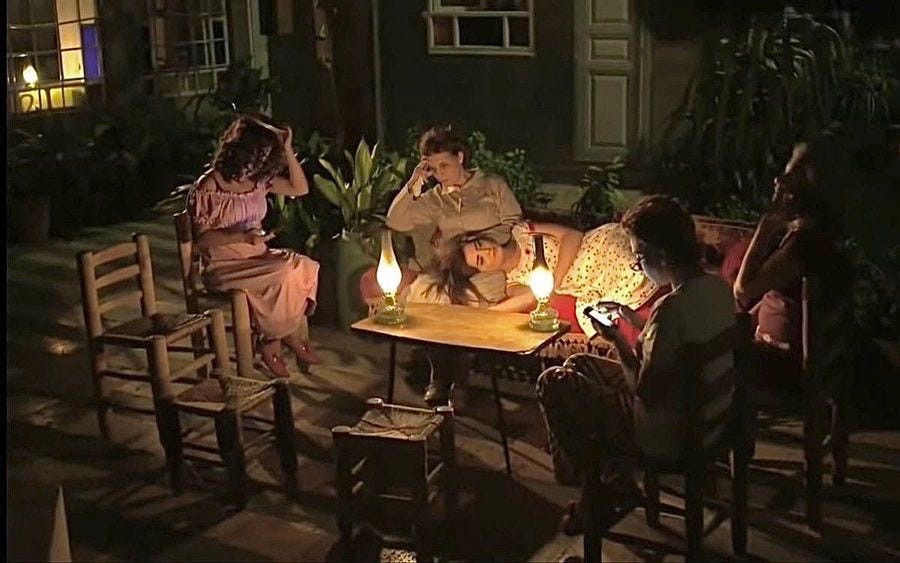most of us, including myself, believe that the most important thing you could be was self-aware. not kind, not clever, not charismatic — just deeply, impressively self-aware. the kind of person who know exactly why they said what they said, who can name their childhood wounds in therapy-ready language, who understand their flaws not just intellectually but narratively — with a touch of grace, a dose of humor, and a curated aesthetic of accountability. in a world obsessed with projection and performance, self-awareness felt like resistance. it feels like truth. it feels like power.
but i’ve started to wonder if that’s the whole story. because lately, i’ve noticed something strange: the more self-aware i become, the more hesitant i feel. the more language i have for my patterns, the less willing i am to interrupt them. the more insight i gather about my fears, the more emotionally paralyzed i seem to be. and i don’t think i’m alone in this. there is a version of self-awareness that doesn’t liberate — it immobilizes. and that version, i fear, is the one we’ve turned into a lifestyle.
we live in a time where knowing yourself is a form of cultural capital. not just in the therapeutic sense, but in the digital sense. it’s aesthetically pleasing to be introspective now. to know your trauma types and your apology language. to quote glennon doyle and bell hooks in the same breath. to turn your personal history into something narratable. legible. maybe even shareable. and while some of this is beautiful — even healing — there’s also something deeply exhausting about constantly watching yourself.
because at a certain point, you stop living. you start narrating. you start imagining your emotions through the lens of how you might explain them later. you become a character in your own story, and not always in the empowering, main-character-energy way. sometimes, you become your own surveillance system. tracking your motives. observing your micro-triggers. scanning for dysfunction. and the irony is: the more you analyze yourself, the harder it becomes to feel like a person.
it hasn’t always been this way. in ancient greece, the phrase know thyself was carved into the temple of apollo at delphi — a guiding principle of philosophy. but that knowledge was meant to ground you in the reality of your limits, your mortality, your place in a larger cosmos. not in the curated online identity that now defines how we relate to ourselves. socratic inquiry wasn’t built for followers. it was meant to orient you toward truth — not performance. but somewhere between aristotle and instagram, self-awareness became aestheticized. marketed. flattened into tropes that are easy to post but difficult to live.
there’s a passage in deborah levy’s things i don’t want to know where she writes, “to become a writer, i had to learn to interrupt other people… and eventually, to interrupt myself.” and i think about that a lot. because self-awareness should be an interruption. a wake-up call. a necessary discomfort. but what happens when it turns into just another performance? when it becomes a clever way of staying the same? when it gives you the illusion of growth without the messiness of actual change?
i’ve seen it in myself and in others. the way we name our patterns and still cling to them. the way we explain our attachment issues and still ghost people. the way we use language like “boundary” or “trigger” or “inner child” to justify emotional avoidance. it’s not that we’re faking it — it’s that we’ve absorbed the vocabulary of healing so well, we forget it’s not the same as healing itself. we think if we can name the feeling, we’ve done the work. but naming isn’t the same as processing. insight isn’t the same as integration.
in eastern philosophy, especially in buddhist teachings, self-awareness is inseparable from detachment. not the icy kind, but the soft unraveling of ego — the understanding that awareness must lead to surrender. not branding. not intellectual scaffolding. not control. but in the west, we’ve taken the language of awareness and grafted it onto the logic of capitalism. we use it to refine our personas, improve our romantic “offerings,” optimize our productivity. and in doing so, we lose the humility that true awareness requires.
this culture rewards cleverness, not wisdom. it celebrates people who can articulate their pain — not always those who have transmuted it. the literary theorist eve sedgwick once warned about “paranoid reading” — the idea that we’ve become so trained to anticipate harm, we miss the possibility of joy. i think many of us live in “paranoid knowing.” we are so hyper-aware of our trauma, our red flags, our dysfunctional patterns, that we begin to preemptively defend ourselves from even the possibility of connection. we narrate our self-awareness as a preemptive apology, a way of saying: “i know i’m messy — don’t worry, i’m managing it.” but are we?
social media hasn’t helped. platforms like tiktok and instagram have turned emotional language into trends. people share trauma responses with background music. they diagnose themselves with conditions they only partially understand. nuance disappears. we begin to think in mental health catchphrases. therapy speak becomes the lingua franca of online identity — a shorthand for depth, but not a substitute for it. and while access to emotional vocabulary is important, the speed at which we consume and mimic it can reduce reflection to mimicry.
and there’s another cost: when you’re always observing yourself, you stop trusting yourself. you second-guess your instincts. you doubt your joys. you begin to approach life like a research subject, not a participant. and eventually, even your most spontaneous emotions feel suspect — like they’re part of some unresolved pattern you haven’t yet named. you don’t just feel grief. you wonder whether you’re processing it in a healthy way. you don’t just fall in love. you analyze whether it’s an avoidant-anxious loop. and while some of this can be useful, it can also be deadening.
sometimes i envy people who don’t think so much. not because they’re naïve, but because they seem to know how to be present. how to laugh without evaluating the psychology of it. how to cry without dissecting the lineage of their sadness. how to change their minds without narrating the entire arc of personal growth. their awareness is lived, not performed. felt, not staged. and while it may be less elegant, it’s often more real.
there’s also something deeply lonely about this kind of hyper-self-awareness. you begin to feel like no one understands you because you’re always ten steps ahead of your own reactions. you’re explaining things no one asked about. you’re managing perceptions that no one expressed. and you start to believe that connection requires preemptive control — that you must always show your work in order to be worthy of love. but the people who love you don’t need a thesis. they need your presence. your mess. your warmth. your unfinishedness.
so what’s the alternative? do we give up on knowing ourselves? do we stop analyzing? do we stop growing? no. but maybe we stop treating self-awareness as the final goal. maybe we stop fetishizing insight and start valuing embodiment. maybe we allow ourselves to be seen not as polished narrators of our own psyches, but as humans who are still stumbling through the unknown.
there’s something radical about saying: “i don’t know why i feel this way — but i’m going to sit with it.” or “i don’t have language for this yet, but it’s real.” or even, “i thought i knew myself, but today i’m not so sure.” uncertainty, too, is a form of awareness. and sometimes, it’s the most honest kind.
because the truth is: real self-awareness isn’t always elegant. it’s not always shareable. it doesn’t always come with a caption or a book recommendation. sometimes it looks like saying sorry before you’re ready. sometimes it looks like pausing before you react. sometimes it looks like staying when you want to flee — or leaving when everything looks perfect. and sometimes, it looks like living a moment fully, without any intention of explaining it later.
if you, like me, have been living too long in your head — analyzing, observing, narrating — this is your reminder: you don’t need to turn every experience into a metaphor. you don’t need to explain your growth in public. you don’t need to have a perfect understanding of your patterns to be worthy of softness. you are allowed to just be here. as you are. in motion. unfinished. because maybe the point of self-awareness isn’t to make yourself more legible. maybe it’s to live in such a way that legibility no longer matters. maybe it’s not about being easy to understand — maybe it’s about being whole.











What a gem of a piece. I seldom comment on the social media of strangers but I felt compelled to because of the complete honesty and accuracy of this piece. It felt as if I was reading thoughts I’ve been thinking for years but never really had the words to articulate them. I think so many of us crave the feeling of being explainable, digestible, understandable and so we minimize the complexity of our experience in order to be easier to comprehend to ourselves and to others. There’s such value in being okay with the uncertainty and the nuance. We don’t need to be able to explain everything
I love these reflections. I think we often define self-awareness as a narrative, but then we become attached to the narrative and identify with it, so nothing changes. Real self-awareness may be to know that the narrative is just another layer full of distractions and defences, and that we don't always fully know what lies behind. It's hard to let go and accept not knowing when you identify as someone self-aware, but I think it's necessary, and often more true than holding on to all our explanations.